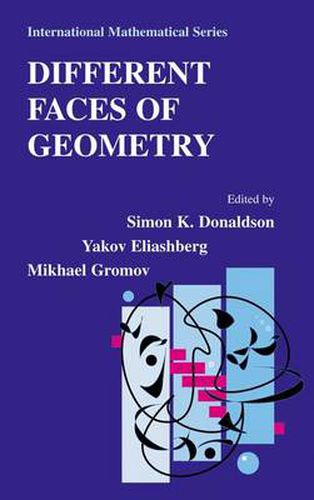Readings Newsletter
Become a Readings Member to make your shopping experience even easier.
Sign in or sign up for free!
You’re not far away from qualifying for FREE standard shipping within Australia
You’ve qualified for FREE standard shipping within Australia
The cart is loading…






This title is printed to order. This book may have been self-published. If so, we cannot guarantee the quality of the content. In the main most books will have gone through the editing process however some may not. We therefore suggest that you be aware of this before ordering this book. If in doubt check either the author or publisher’s details as we are unable to accept any returns unless they are faulty. Please contact us if you have any questions.
Different Faces of Geometry - edited by the world renowned geometers S. Donaldson, Ya. Eliashberg, and M. Gromov - presents the current state, new results, original ideas and open questions from the following important topics in modern geometry: These apparently diverse topics have a common feature in that they are all areas of exciting current activity. The Editors have attracted an impressive array of leading specialists to author chapters for this volume: G. Mikhalkin (USA-Canada-Russia), V.D. Milman (Israel) and A.A. Giannopoulos (Greece), C. LeBrun (USA), Ko Honda (USA), P. Ozsvath (USA) and Z. Szabo (USA), C. Simpson (France), D. Joyce (UK) and P. Seidel (USA), and S. Bauer (Germany). One can distinguish various themes running through the different contributions. There is some emphasis on invariants defined by elliptic equations and their applications in low-dimensional topology, symplectic and contact geometry (Bauer, Seidel, Ozsvath and Szabo). These ideas enter, more tangentially, in the articles of Joyce, Honda and LeBrun. Here and elsewhere, as well as explaining the rapid advances that have been made, the articles convey a wonderful sense of the vast areas lying beyond our current understanding. Simpson’s article emphasizes the need for interesting new constructions (in that case of Kahler and algebraic manifolds), a point which is also made by Bauer in the context of 4-manifolds and the 11/8 conjecture . LeBrun’s article gives another perspective on 4-manifold theory, via Riemannian geometry, and the challenging open questions involving the geometry of even well-known 4-manifolds. There are also striking contrasts between the articles. The authors have taken different approaches: for example, the thoughtful essay of Simpson, the new research results of LeBrun and the thorough expositions with homework problems of Honda. One can also ponder the differences in the style of mathematics. In the articles of Honda, Giannopoulos and Milman, and Mikhalkin, the geometry is present in a very vivid and tangible way; combining respectively with topology, analysis and algebra. The papers of Bauer and Seidel, on the other hand, makes the point that algebraic and algebro-topological abstraction (triangulated categories, spectra) can play an important role in very unexpected ways in concrete geometric problems. - From the Preface by the Editors
$9.00 standard shipping within Australia
FREE standard shipping within Australia for orders over $100.00
Express & International shipping calculated at checkout
Stock availability can be subject to change without notice. We recommend calling the shop or contacting our online team to check availability of low stock items. Please see our Shopping Online page for more details.
This title is printed to order. This book may have been self-published. If so, we cannot guarantee the quality of the content. In the main most books will have gone through the editing process however some may not. We therefore suggest that you be aware of this before ordering this book. If in doubt check either the author or publisher’s details as we are unable to accept any returns unless they are faulty. Please contact us if you have any questions.
Different Faces of Geometry - edited by the world renowned geometers S. Donaldson, Ya. Eliashberg, and M. Gromov - presents the current state, new results, original ideas and open questions from the following important topics in modern geometry: These apparently diverse topics have a common feature in that they are all areas of exciting current activity. The Editors have attracted an impressive array of leading specialists to author chapters for this volume: G. Mikhalkin (USA-Canada-Russia), V.D. Milman (Israel) and A.A. Giannopoulos (Greece), C. LeBrun (USA), Ko Honda (USA), P. Ozsvath (USA) and Z. Szabo (USA), C. Simpson (France), D. Joyce (UK) and P. Seidel (USA), and S. Bauer (Germany). One can distinguish various themes running through the different contributions. There is some emphasis on invariants defined by elliptic equations and their applications in low-dimensional topology, symplectic and contact geometry (Bauer, Seidel, Ozsvath and Szabo). These ideas enter, more tangentially, in the articles of Joyce, Honda and LeBrun. Here and elsewhere, as well as explaining the rapid advances that have been made, the articles convey a wonderful sense of the vast areas lying beyond our current understanding. Simpson’s article emphasizes the need for interesting new constructions (in that case of Kahler and algebraic manifolds), a point which is also made by Bauer in the context of 4-manifolds and the 11/8 conjecture . LeBrun’s article gives another perspective on 4-manifold theory, via Riemannian geometry, and the challenging open questions involving the geometry of even well-known 4-manifolds. There are also striking contrasts between the articles. The authors have taken different approaches: for example, the thoughtful essay of Simpson, the new research results of LeBrun and the thorough expositions with homework problems of Honda. One can also ponder the differences in the style of mathematics. In the articles of Honda, Giannopoulos and Milman, and Mikhalkin, the geometry is present in a very vivid and tangible way; combining respectively with topology, analysis and algebra. The papers of Bauer and Seidel, on the other hand, makes the point that algebraic and algebro-topological abstraction (triangulated categories, spectra) can play an important role in very unexpected ways in concrete geometric problems. - From the Preface by the Editors